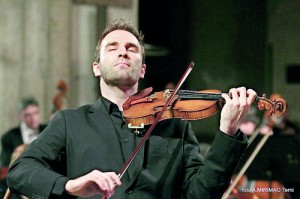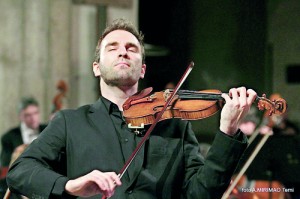The duo who click musically
Two celebrated musicians, violinist Stefan Milenkovich and pianist Rohan de Silva will perform this month, on May 28 and 29 at the Lionel Wendt Memorial Theatre in their third collaboration in concert in this country, and again, in support of the charitable work of the Sunera Foundation.
One is not forgiven for arriving at a conclusion such as ‘Ah! I’ve heard them perform before’, for the reason that no two concert performances are in imitation of each other, and neither a repetition of what may be heard (listened to) in a recording on CD or any other methodology one is able to access in a tech savvy world we now inhabit. This is a human enterprise, and it is one which has resonance as a communication of artistic taste, intellect and response to subtle dynamics as affect the mind and emotion.

Stefan Milenkovich
The moment has its own iridescent mood, the musicians capture the ephemeral, the audience is illumined, and nothing is ever the same on every occasion. Why? Because the maturity that accrues with time influences the expression. Stefan Milenkovich opines, “For me, life and art is indistinguishable. In order to grow as an artist, it is absolutely necessary to grow and explore as a person. This curiosity and experience then translates in anything you do, and anything you interpret. Also, it gives you a different perspective on things which then contributes to experimentation in your interpretation. So, in this respect, many, many things have changed since the last time I came to Colombo and I can’t wait to share my life through music with your audiences again.”
What would be Rohan’s view? “The last time I performed in Colombo was in 2012, at the Galle Face Hotel, but in a different context from the forthcoming events for Sunera. Even since then, I feel that I am always growing as a performing artist. Most important is to stay focused, motivated and to constantly explore different ideas so that one does not get bored. Experimenting with your own interpretation is important.”
The Lankan Rohan and the Serbian Stefan first began working together as performers about 20 years ago. From then on, they have appeared on the concert stage and also have been able to collaborate in the recording studio, this, as recently as 2013. Both have been inducted into the mainstream of classical music and its interpretation. This is a relevant factor, namely, ‘interpretation’, which some may well think of within the confines of the remote (sometimes deceased) composer of a musical opus needing to be communicating his intent, with the players as mere conduit. That, though, may not be the definitive approach as we discern from Stefan’s comment, “you need to be inspired by your work at all times in order to keep going. To be inspired, you need to be motivated, and that means different things to different people. In my case, the world itself motivates me, as well as the variety of musical experiences as well. My training is classical and that remains forever a point of reference for me. But being in touch with other musical genres greatly enhances

Rohan de Silva
the classical experience so I try to keep my curiosity high and participate in projects that are non-classical as well. Then practising comes naturally, as well as repertoire and natural challenges when confronted with the unknown. I personally love that feeling, and it keeps me going.”
Rohan’s own sentiments seem to parallel those of the violinist, when he observes, “You have to be very flexible. Sometimes you get lucky when you feel a phrase the same way and you breathe together. Real partnership is when you don’t have to discuss musical ideas but feeling from within you takes over. The other person reacts to your ideas spontaneously which enhances music making as a sheer joy. That is what performing is all about. Stefan has said the rest! We have a strong bond between us that has grown over the past 20 years and we enjoy working with each other tremendously. Sometimes we get together after many months to play but this does not affect our musical ideas or friendship at all. It always begins from where we ended last.”
Stefan in addition to the excitement he brings to his performance, is also known for being a ‘dazzling’ violinist, one who has the capacity to move beyond ‘playing the piece’, but one who also allows the audience to lapse into a sense of disbelief at what they see and hear. Given his penchant for achieving convincing results with his several recordings of works associated with the legendary Paganini (on the Italian “Dynamic” label), one appreciates the strength of his considerable appeal amongst a worldwide audience.
When asked about this element of, what may be termed, showmanship, Stefan says “ I think it really boils down to personality on stage. Sure, the audiences like to hear and see a human being performing something that requires great ability and preparation, but I think the audiences also come for the artist himself, to see that particular human being let go and draw them into his or her world.Personally, my philosophy is that I don’t want to play FOR the audience, but WITH the audience, connecting on an energy level. For me a performance is a human event, not “just” a concert. The people should feel they are participating in the event, rather then just assisting in it, so I do talk a bit and introduce the works I’m about to play, and often encourage people to ask questions as well. That’s my approach, and perhaps it is what is a bit different then, from some other artists.”
The pianist de Silva, concurs. To him too, the immediacy of an attentive audience is intrinsic. He notes, rather interestingly, “Personally I find to be on stage performing is more enjoyable than at a recording. The concert hall has an audience which you are playing for, whereas you have to mentally prepare and pretend as if an audience is listening to you, inside a recording studio. Nowadays recording has an advantage with endless editing possibilities to make it appear ‘perfect’. But sometimes it is very difficult to keep the mental stamina relevant throughout the recording session, as it gets very tiring and exhausting.”
Stefan adds his perspective on taking on a recording date, “Well, call me old school, but I still do believe you should prepare equally well for both a concert on stage and a recording studio. It used to be that someone would be offered a recording contract because they could virtually play the piece flawlessly from beginning to the end. Now, someone would say that “things happen” in a performance because it’s “live”, and that playing flawlessly for a recording isn’t that important either since you can edit it. Personally, I think the recording should capture your performance, not just your “playing”. This means the same level of preparation as for the performance, and certainly an amount of musical – and even technical – risk-taking in order to leave something unique on the record.”
“The way I see it is that recordings are very important as part of your personal history and legacy, as well as immortalising certain projects or simply musical moments in a certain time and space. But they are not as career defining as they used to be.”
Rohan and Stefan collaborated on a recording project in the autumn of 2013. The album features some of the most popular showpieces for violin and piano by Ravel, Sarasate, Paganini, Tchaikovsky, and many others. How does a programme of this nature ‘happen’? “I think it sometimes just happens, “clicking” with the right person, in the right time and place. So it happened with Rohan and me. We met almost twenty years ago during a competition in Germany, then played for the first time the following year during a festival in Aspen, Colorado. Somehow, our musical approach and sensitivity instantly brought us together, and we remained musically connected ever since. As a result of that, our friendship grew over the years as well and forged into a strong bond. So, any time I can, I will ask Rohan to play because I know we will have a great time, both musically and personally.”
Stefan has been known to play on several of those legendary centuries old violins, an Amati, a Guarnerius and a Stradivarius, at different times in various locations. It would be interesting to know what instrument will resonate across the proscenium at the Lionel Wendt Theatre this May. While we can be assured that the violinist will have intimate knowledge of his chosen instrument, the challenge for his collaborator is sizeably different! Rohan says, “Being a pianist, it is the constant battle with Pianos at different venues around the world. There is certainly an advantage for an instrumentalist where he or she carries their instrument always.When you have a wonderful Piano (more often than not) then you don’t have to think about how the instrument is going to respond BUT to perform at your best.”
Stefan has another interesting musical departure that defines his “questing” spirit, and that is with his recent recording of “Tango Compas” in collaboration with piano accordionist Marko Hatlak. This describes a fresh dynamic and wholly different oeuvre from the baroque, romantic or impressionist as comprise the classical vernacular. He explains how this occurred, “ I got into dancing tango first. It’s an incredibly fascinating dance, unique in its content, really. So somehow naturally after that I was drawn to the idea of connecting this passion and hobby with my profession.” Are there other contemporary composers or collaborators that he would fancy working with? “There are many, I suppose, but certainly one of them is Sting. He is a classical pop star, and I see myself as a non-classical classical musician.”
How much of this ‘fresh’ initiative will be manifest at the Lionel Wendt Theatre is yet to be seen! Stefan’s passion for life and the innate curiosity that motivates these tangential pursuits is clearly to be seen in what he says about the many things that absorb his interest; “There are more my interests and hobbies that I pursue, with certain goals in mind. For example, I love riding motorcycles and had a dream of crossing the entire US – so my fiancée and I did that last year. Also, in my “free” time, I like to skydive so the next threshold is reaching 500 jumps. As I’m on no. 495 right now, I’m looking forward to celebrate that this summer.Considering my curiosity, who knows? The world is an amazing place and full of experiences to be had. We are only limited by our own ambition to expand.”
Rohan de Silva continues to have a very busy schedule of performing and travel, most often as the preferred collaborator with that other violin virtuoso Itzhak Perlman, while being the preferred choice of many virtuosi such as Gil Shahan, Midori and Joshua Bell. Also, in recent times as a much valued collaborator with another ‘up and coming’ violinist Augustin Hadelich. Just earlier this May, Itzhak and Rohan were in Omaha in a concert that has drawn the finest reviews with special mention of the pianist’s consummate artistry. While Rohan may not attempt skydiving anytime soon, he does follow the direction from whence emerge the fragrance of the finest food, and his cultivated taste buds will with alacrity discern the sybaritic from the vacuous! But, seriously, he has a commitment to teaching as well, being a faculty member of the Perlman Music Program on Long Island, and also The Juilliard School and the Ishikawa Music Academy in Japan. Rohan’s tip for those who wish to pursue musical careers? “Practise slowly, work hard, focus and be passionate at what you do.”


